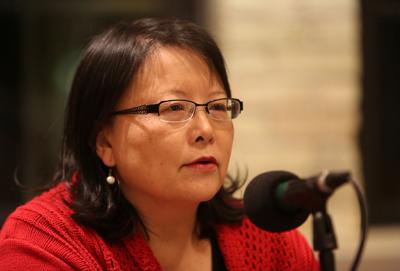Mai Zong Vue thought it would just take a minute or two to check in with a woman she knew and give a quick update on boxes of food available for families in need. Instead, she wound up on the phone for an hour-and-a-half with a mother whose child died of COVID-19 back in April.
It was a difficult, emotional call, similar to what many volunteers staffing the Madison Hmong Institute’s helpline have been experiencing lately. But the calls have stretched the organization’s small staff thin. What normally would be calls limited to 15 minutes are now going well past the 90-minute mark.
Vue said the demand for emotional support in the community has hit an apex that has become nearly impossible to keep up with.
“Our staff is overwhelmed doing the tele-help services for the elders and our services are pretty stretched,” Vue said. “You provide counseling as long as the client needs and it is taking a toll on the staff.”
Fears were stirred across Madison’s Southeast Asian community just prior to the pandemic when President Donald Trump implied that deportations could include Hmong and Cambodian refugees.
Those fears have been realized.
“A Hmong family and a couple of Cambodian families went through the raid this summer,” Vue said. “One mom said, ‘This is a nightmare. I want to be able to wake up from it and say it was just a nightmare.’ But it’s real.”
around Madison. Many Hmong elders also worry a stigma could be attached to their families, as if getting COVID-19 meant they had done something wrong.
“It’s really hard on families,” Vue said. “The biggest fear for the elders is if they have it and go into the ER, they won’t see their family ever again. Once you’re taken to the hospital it’s basically a death wish because you will die alone and your family won’t be able to see you.”
For many of the elders, this emotional turmoil has triggered PTSD from the aftermath of the Vietnam War (as well as the war itself), when Hmong families were murdered during a genocide and refugees were forced to flee to the United States, where they had to start over in a new land without any confidence that loved ones left behind would be safe.
“And now we’re back to being unsure where you’re going to get food. Now the future looks dark and uncertain,” Vue said. “Some elders are able to talk about it and grieve their losses and move on. Other elders, the emotional impact is so deep and they are afraid to talk about it because they fear that no one will understand them and it will bring more stigma to them.”
Economic fallout from COVID-19 has forced families to consolidate, with grandchildren moving in with elders, whose living spaces may be small. Under normal circumstances, this would be difficult. But with the grandchildren attending school from home, the pressure is constant.
“It’s another challenge where many people live in crowded spaces without a lot of money and food on the table,” Vue said. “And now where do kids have a private space to study? How do things stay together at a time where things are uncertain?”
On top of that, the relationships between the generations can sometimes be culturally complicated. Many of the elders grew up in a different land with different values, but their grandchildren are Americans.
“Some kids don’t have the ability to understand what their grandparents went through and that’s an even bigger gap,” Vue said. “There’s children totally disconnected from their heritage trying to live a mainstream life, developing their identity from what they’re seeing on social media.”
One initiative that has been helped, Vue said, is a food drive run out of the Hmong Institute, 4402 Femrite Dr. Care boxes filled with food are given to families in need on the first and third Friday of every month. According to Vue, over 170 families are currently receiving food boxes.
“We started to do the food care boxes to provide nutritious food they can cook with,” Vue said. “This has been a great way to understand the needs of the community just by looking at the size of families that are in need.”
The food boxes are paid for using a grant from the Wisconsin Partnership Program as well as some assistance from Second Harvest. The grant, however, runs out at the end of October and Vue anticipates the need will extend well past that date.
“We are asking for community donations to help,” she said. “We will try as much as we can to hold on as long as we can. Right now we’re taking donations because the need is great.”
In addition to needing donations and volunteers to help hand out the food boxes, Vue said volunteers are needed to staff the helpline. Volunteers for that job need to be bilingual, but adding more hands will be a big boost for the exhausted staff.
“The bilingual resource line is helping people increase access to services whether it’s job benefits, access to food, COVID-19 resources, whatever they need. It enables them to breathe and ask for help,” Vue said.
The Hmong Institute helpline number is 608-318-4354. All information is kept confidential and resource staffers speak Hmong, Lao, Khmer, Tibetan, Nepali, Karenni, Burmese and English.



